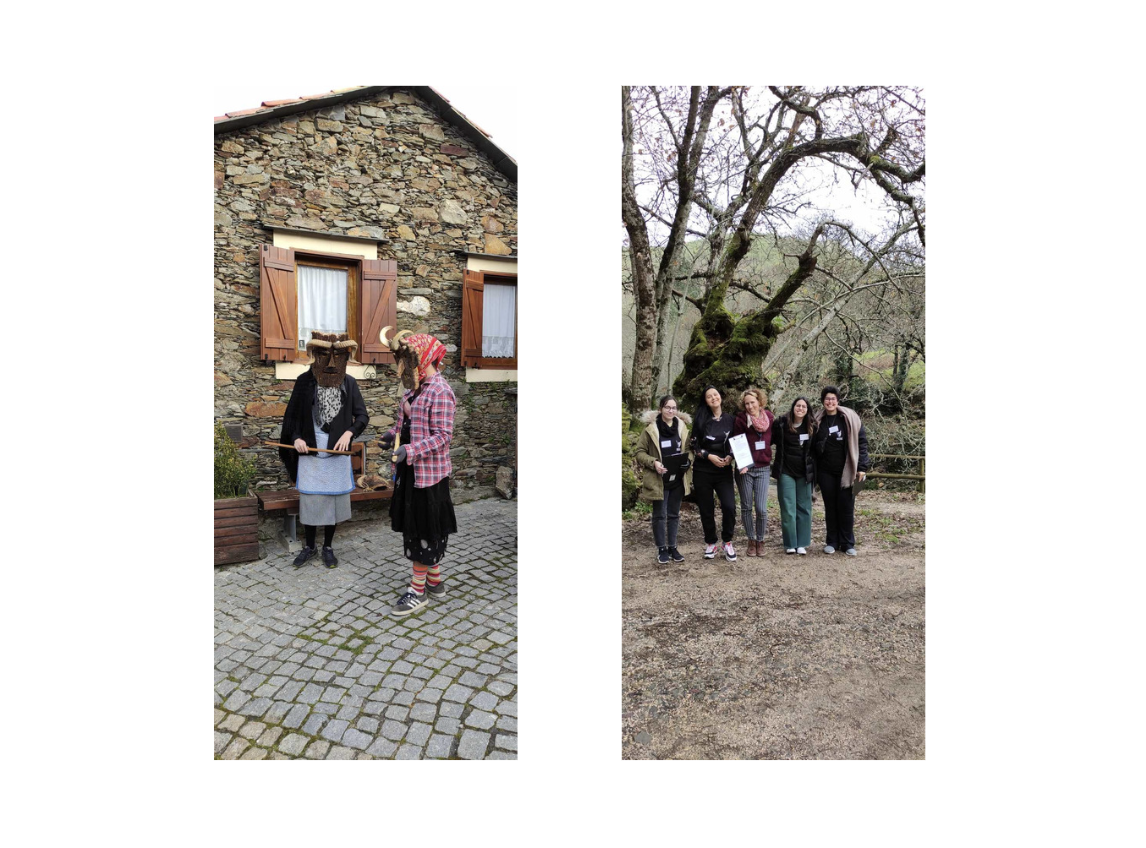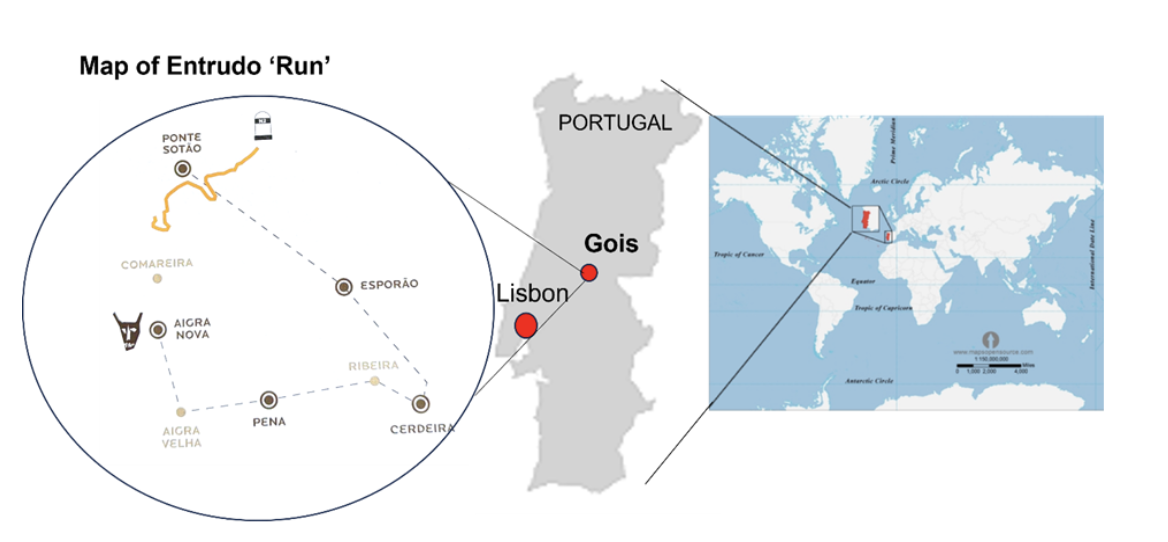By Fiona Eva Bakas, Lusófona University and IGOT, Lisbon University, Portugal
Nestled in the remote mountains of Central Portugal, lie three small villages: Pena, Aigra Nova, and Aigra Velha, better known as the Serra de Lousa, Góis Schist villages. Social isolation and depopulation are acutely visible in this area; each one of these mountainous and remote villages is home to only 1-8 elderly inhabitants. In rural areas, however, small-scale festivals can play a significant role as a tool for tourism development and local sustainable development (Bakas et al., 2019).
Welcome to the Entrudo de Góis
In the context of marginalised mountainous communities, mountain areas affected by a high level of depopulation and an ageing population, organisers of the annual Entrudo de Góis carnival-festival use local heritage to revitalise carnival traditions and their connection to tourism. Entrudo de Góis is a traditional Portuguese carnival-festival that has been taking place since 2006 in Góis, Central Portugal, and derives from ancient pagan carnival celebration traditions combined with local myths. The carnival-festival is community-led, involving locals in the preparation and implementation stages, and is proudly presented by locals as part of their cultural heritage. These festivities also attract international and national visitors.
 Entrudo de Góis carnival-festival costumes (credits: Fiona Bakas)
Entrudo de Góis carnival-festival costumes (credits: Fiona Bakas)
The Entrudo, for short, is a one-day event held on ‘Domingo Gordo’ (Fat Sunday, the Sunday before Shrove Tuesday), which features a group of ‘folioes’, a devoted group of people who wear cork masks that completely cover their face and hair and cross-dress in the style of ‘local villager clothes.’ On the day of the Entrudo, the folioes group completes the Entrudo Run (‘Corrida do Entrudo’ in Portuguese), starting from the village of Aigra Nova to another four neighbouring villages where they arrive playing music, teasing the villagers, and, in general, making a lot of noise.

Corrida do Entrudo path (credits: Fiona Bakas)
The event consists of various key moments:
- Preparing and dressing up of folioes at Aigra Nova
- The folioes visit in four nearby villages – Pena, Cedreira, Esporao, and Ponte Sotao
- The folioes’ return to Aigra Nova and lunch
- Dancing and music led by local musicians, and a mask-making workshop
- Competitively climbing a slippery wooden pole (like a telephone pole) to reach a big piece of cod and ham
- ‘Quadras jocosas’ – a social critique in the form of humorous rhymes about the locals
- Burning of the ‘Entrudo’ (effigy of the personified Carnival)
In each village that is visited, the ‘Quadras jocosas’ is a key moment when everyone gathers to hear the social critique and whether anything is being said about them. In this unique and fragile mountainous area, the value of these small-scale carnival-festivals is reserved for local inhabitants to promote strategic practices that will enhance the well-being of local mountain communities.
How can festivals and other cultural events positively impact marginalised mountainous villages?
Community events play a significant part in structuring and maintaining societies and are a phenomenon inherent to humans and social groups (Pernecky, 2013). Festivals, defined as “the celebration of a specific theme to which the public is invited for a limited period of time” (Grappi & Montanari, 2011, p. 1129), are one of the fastest growing types of events, and have increased in number, diversity, and popularity since the 1980s. Small-scale festivals in particular are frequently associated with social connectedness and cultural vitality in smaller communities and rural areas.
In small cities and rural areas, community engagement in small-scale festivals is key for them to serve as a vehicle for sustainable development, reinvigorate latent cultural heritage, potentially stimulate inward migration, and enhance community resilience (Qu & Cheer, 2022). Festivals can be seen as a strategy to achieve economic development by connecting to tourism, as a means to enhance the life of local people (especially in remote, marginalised mountainous areas), and as a way to reinforce social cohesion within communities (Lee, 2014).
Festivals in theory: how do festivals impact a community?
Festivals are important cultural rituals for two reasons: they establish place identity and support the development of social capital. Identity distinguishes individuals, communities, and places from others; the ability of a place to create and/or maintain its distinct identity links to its inherent intangible heritage, rituals, and traditions. Festivals are interlinked to place identity and sense of place through their meaning for locals and social belonging, which, together with history, fantasy, imagination, and memory, create a unique relationship between people and places. Social capital is defined as the features of social life (networks, norms, and trust) that enable people to pursue shared objectives. Social capital is the force that binds society together, transforming egocentric individuals into members of a community with shared interests, and is linked to co-operation and reciprocity (Ziakas, 2016). Festivals can create social capital wealth by promoting connectivity among various people, such as the festival organizers, volunteers, locals and tourists, thus increasing these persons’ collective social capital.
Lousitânea: Coordinators of the Entrudo de Góis
The Góis municipality is located in the NUTSII Centro region of Portugal and has an area of 263,000km2 and just 3,811 inhabitants according to the 2021 census. Góis is a rural area with 17% of its territory classified as Natura areas. Its tourism lodging capacity in 2020 was built for only 126 people, indicating low levels of tourism development. Whilst tourism in Portugal makes a significant contribution to its economy (bringing in 16.8 billion euros to GDP in 2021 and just over 37 million overnight stays), the Centro region of Portugal is less developed touristically. Góis received just 9,248 overnight stays in 2021 (INE, 2023).
In support of this region’s tourism capacities, the local cultural and environmental NGO Lousitânea coordinates all logistics for the Entrudo de Góis with the help of Góis Municipality. Lousitânea was founded on December 3, 2003, and initially had its headquarters in the town of Góis and later, as of 2009, in the Schist Village of Aigra Nova. The organisation gives special attention and efforts to the development of the Schist Traditions Ecomuseum project. Lousitânea also provides visitors with interactive experiences relating to discovering the intangible and tangible heritage of this special area, for example providing tourism experiences for small groups, featuring traditional bread (‘broa’)-making, making the local grappa (called ‘bagaso’ in these areas), and discovering local walking paths. Lousitânea also has created and maintains an indigenous tree nursery. Through their collaboration with the Benfica national football team, they plant many trees every year in areas that need them to combat deforestation.
In February 2023, Dr Fiona Bakas conducted research on the Entrudo de Góis in terms of how this community-led festival is strategically organised and exploring its impact and meaning for the local community. The photos featured in this blog post were taken in the course of this research, which is currently being written for publication.
Header images credits: Escapada Rural Mag


